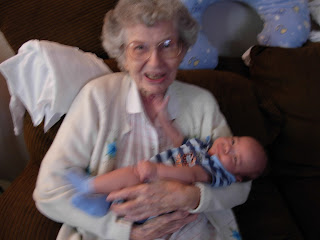Several years ago, my husband, Larry, and I cared for his mother, Audrey, who had Lewy-Body Dementia. It was a rough road. In the beginning, she could still live in her own place with meals delivered to her. But then she became more confused and had delusions, hallucinations, and paranoia. Lewy-Body Dementia has some different characteristics from Alzheimers but some similarities. They are both dementing diseases but Lewy-Body Dementia isn’t as well known. More recently it’s been spotlighted because of actors Estelle Geddy and Robin Williams who had the disease. If you’d like to learn more about Lewy-Body Dementia, check out a very important organization and informative website: Lewy-Body Organization
Tweet this: “When we realized Audrey could no longer stay alone, we knew the inevitable was here: she would live in our home.”
When we realized Audrey could no longer stay alone, we knew the inevitable was here: she would live in our home. As that reality sank in, I sat on our patio watching the sunset and moaned, “My life is over.” Over the two-and-a-half years she lived with us, we not only learned a lot about the disease, we changed through God’s transforming Holy Spirit.
 |
| Audrey and her great-grandson |
Here are some of the many things we learned.
1. Don’t take your elder’s behavior personally. At a support group, we found out that many people who care for the demented commit suicide. The care is so great but even more importantly, the dissatisfaction of people with demented disease causes the care giver to think they aren’t doing a good job–and aren’t a “good” person. We must not take the demented person’s behavior personally. It’s not a comment against us, it’s the corrupted perception of the demented person.
2. A challenge such as caring for the demented is more for the caregiver’s growth than the growth of the elderly. Much of the time, the demented person can no longer make godly choices; the disease has stolen that ability. If we can recognize God has allowed this challenge for the caregiver’s spiritual growth, we can begin to cooperate with God’s plan.
By the time Audrey joined Jesus in heaven, she didn’t know who Jesus or God were, and didn’t know what heaven was. As Larry fondly says, “She may have forgotten God but He hadn’t forgotten her. When she walked into heaven, she must have thought, ‘I knew I’d forgotten something.'”
3. God’s sovereignty is revealed in the life of the elderly. My mother-in-law was healthier than I am—physically. Her blood pressure was better than mine. I saw God’s sovereignty in His extending her life. His sovereignty was also revealed in the different definition He has about a person’s value. Audrey had nothing to offer—at least that’s what she claimed. But God said her value was as great as my grandson’s.
4. God defines ministry different than most of us. As a writer and speaker, I have valued speaking to thousands of people and having my books reach thousands. But God chose that season of my life to minister to the widow with little ministry outreach. He says that is important work, even though most people didn’t understand our commitment and Christians often don’t value ministry to the sick individual. God repeatedly says in Scripture to care for the widow and the needy.
5. You won’t give care to a demented person perfectly. You will become frustrated. You will not always know the right thing to do or say. You’ll say the wrong thing. But like any other challenge, God is using the trial to make a difference in you.
Although we would have preferred not going through this trial, we saw God’s hand of love. We grew in our trust of God.
And when I became the main go-to-person when my mother needed care a year later, I was more prepared–but I still didn’t do that perfectly either. But I trusted God even more.
Any kind of dementia is a horrible experience for everyone affected. At times it feels hopeless and unending. And I know of people who have cared for their loved ones much, much longer than we did. But God knows what He’s doing and is worthy to be trusted.
